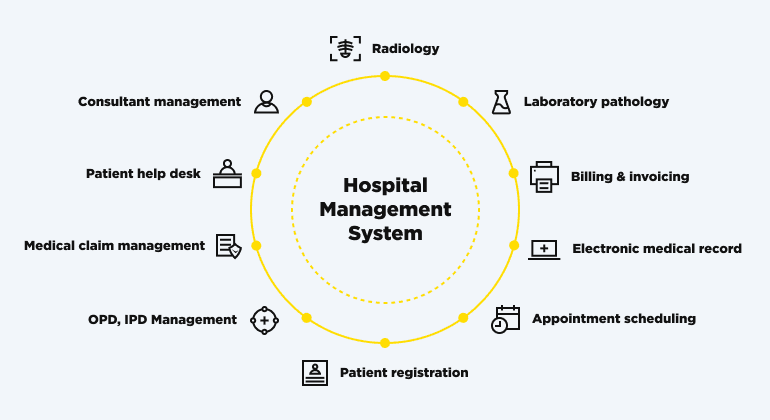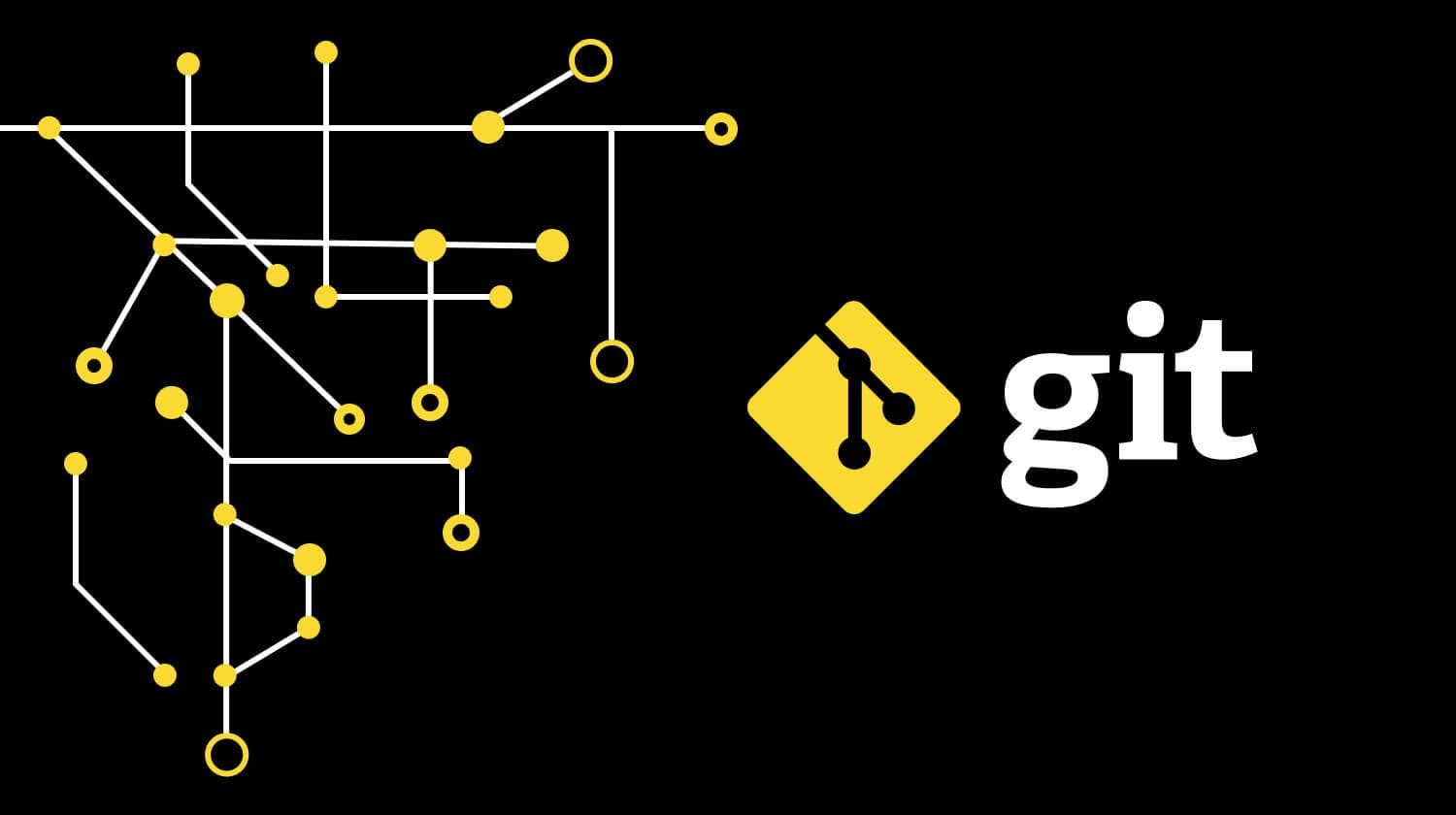The retail landscape is nothing like it used to be. It has been developing at breakneck speed. You wanna guess what stands at the forefront of this transformation? Of course, generative AI! As technology advances, so too does the way we shop, both online and in-store. On top of that, AI is rewriting the rules of customer engagement, making retail more seamless, interactive, and tailored to individual needs. From personalized shopping experiences to virtual try-ons. Everything is different now. What is more, about 82% of organizations that are considering or already using generative AI are convinced it will either significantly change or transform their industry, Google Cloud Gen AI Benchmarking Study states.

The future seems even more interesting! In fact, 48% of retail business owners predict that artificial intelligence, machine learning, and computer vision are to become top technologies for the retail industry in 3 to 5 years. Furthermore, 60% of retailers plan to adopt these retail solutions next year for better in-store and online experiences. Overall, they can expect an entirely new level of convenience, with generative AI development handling everything from anticipating demand to curating products based on personal tastes. Let’s dive into what’s next and how generative AI in retail is shaping the future of shopping.
How Do You Define Generative AI?
Generative AI has been taking the tech world by storm. And we must say it’s easy to see why. At its core, it’s a type of artificial intelligence that’s trained to create new content, whether that’s text, images, videos, or even designs. It learns patterns from existing data. To put it simply, it’s like teaching a machine to get creative, generating compelling product descriptions, unique marketing content, and even writing lines of code. Think of it as your supercharged digital assistant with creative flavor. While traditional AI used to focus on analyzing and automating processes, generative AI is here to bring in fresh, innovative content.
But how does this apply to retail? Retailers are constantly looking for ways to stand out in a saturated and competitive market. From personalized shopping experiences to smarter inventory management, generative AI might just be the key to shaking things up.
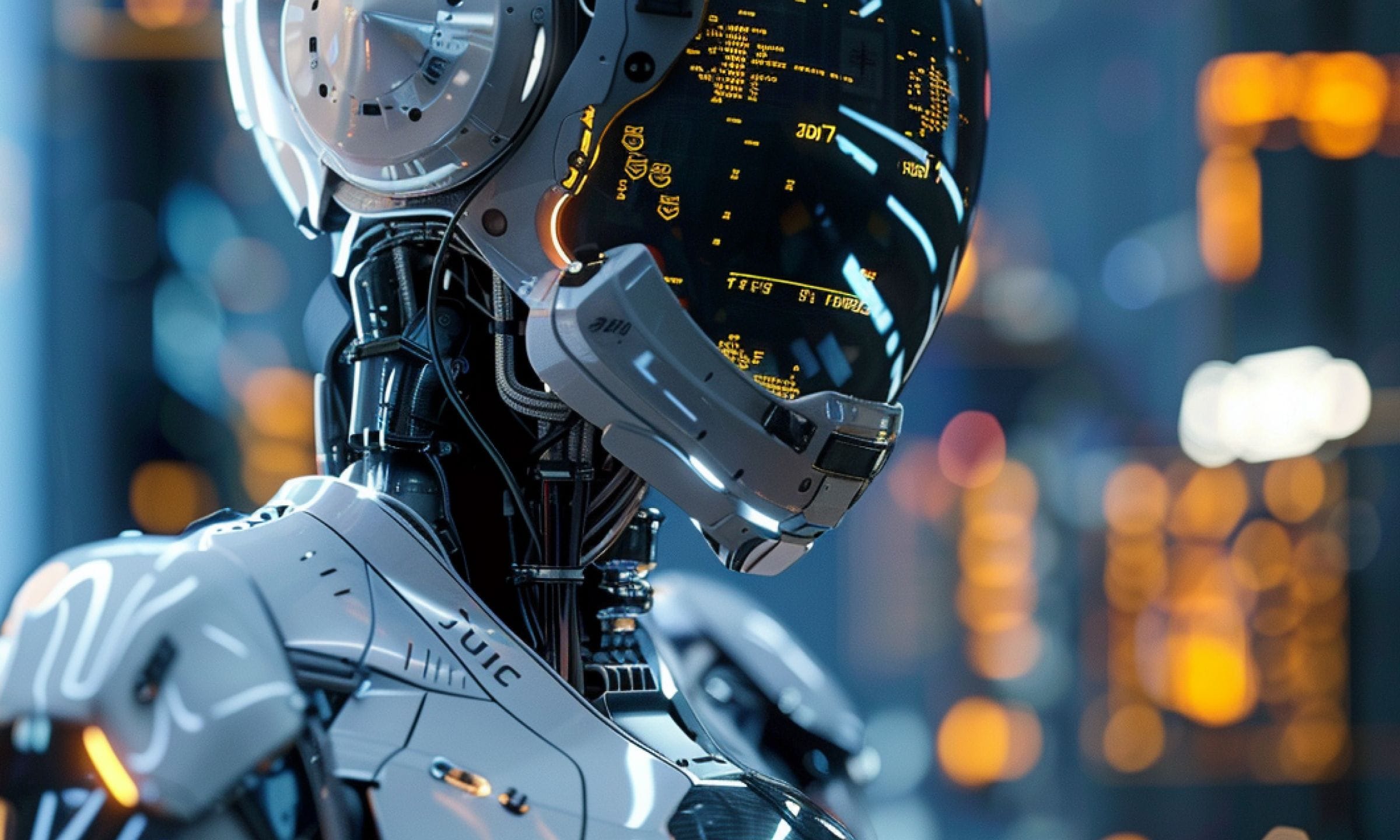
Does your retail business need a boost?
Contact usWhy Is There So Much Buzz Around Generative AI in the Retail Industry?
Generative AI in retail isn’t just another fancy buzzword for retailers. Without any exaggeration, it’s the next-level tech that’s truly changing how businesses operate. It is not a secret every second is valuable in retail. What is more, retailers face high customer expectations, fierce competition, and an ever-growing demand for personalized experiences.
So, why is generative AI a real game-changer?
#1 Hyper-personalization
Customers want to feel like brands “get” them. With generative AI, retailers can analyze a wide range of data to create ultra-personalized product recommendations, product designs, and even marketing strategies tailored to consumer preferences that eventually boost customer satisfaction.
#2 Faster time to market
New products can hit the shelves (virtual or physical) much faster. Generative AI can design prototypes, optimize supply chains, and adjust inventory before competitors even blink.
#3 Streamlined operations
Retailers can automate tasks that used to take a dozen employees to conduct. From virtual assistants handling customer inquiries to automated product descriptions, the possibilities are endless. According to McKinsey (and we are sure this is the statistic you need to keep in mind), 75% of generative AI's value will be implemented across customer operations.
Generative AI gives retailers tools that can enhance everything from customer experience to back-end logistics. Sounds amazing, right? Let’s move on as we discover more about gen AI's influence on the retail sector.
How Generative AI is Beneficial for Retail's New Reality?
The retail industry has appeared with the main task – to innovate. And generative AI is giving it a serious go, as we all can see. So, what are the benefits gen AI in retail brings? Let’s break them down.
Supercharging efficiency and cutting costs
No retailer likes waste, whether it's wasted time, inventory, or resources. Generative AI helps streamline operations and cut down costs like a pro. From automating manual tasks to predicting demand. AI systems can spot inefficiencies that might go unnoticed by the human eye. This transforms into smarter decision-making and lower operational costs. For your consideration, the Stanford University study defined that generative AI for retail businesses can increase productivity by up to 2% of annual revenue growth.
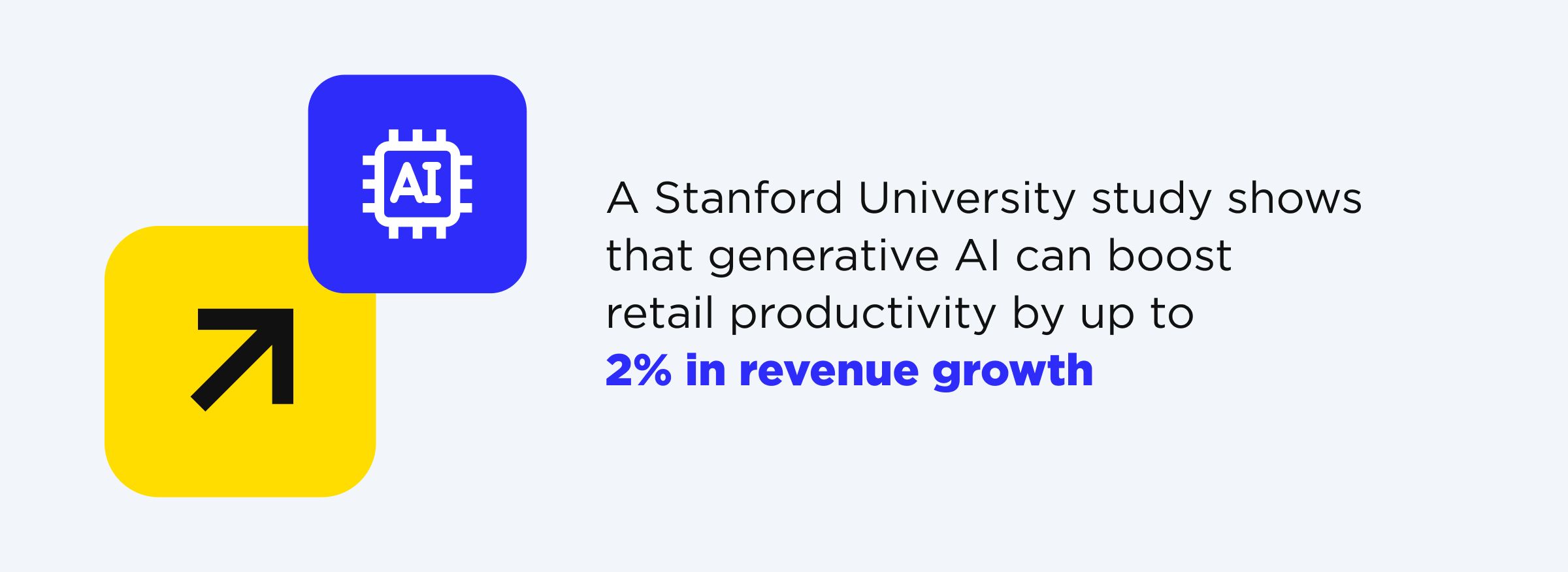
AI can also predict when stock will run out and adjust inventory accordingly, reducing overstocking and/or understocking. Likewise, automated product descriptions and images can save hours for eCommerce teams and improve operational efficiency on the whole.
Keeping customers loyal
Customer loyalty is a tricky thing in the retail world. Everyone's competing for attention, and buyers want more than just products. They crave experiences! With AI, retailers can personalize recommendations down to the tiniest detail (e.g., using past purchases, browsing customer behavior, and even social media trends). Imagine a system that knows when to send a discount code or which products will attract a shopper’s eye. This level of engagement keeps customers coming back. And the best part? It’s all automated.
Next-level customer experiences
AI takes customer interactions to new heights. We’ve all experienced a chatbot that feels like talking to a wall, right? With generative AI, chatbots become way more conversational and helpful. They can understand context, making customer interactions smoother and more human-like. Virtual AI shopping assistants, for example, can recommend outfits or answer specific product questions in real-time, making online shopping experiences feel more personalized and interactive.
Boosted innovation and new product ideas
Generative AI in retail doesn’t just assist with existing products. It also helps retailers brainstorm new ideas. How does it happen? These so-called machines analyze customer feedback, social trends, and historical data. As a result, AI can suggest new product ideas, designs, or updates to existing ones. The best way to imagine it is to think of it as a super-intelligent designer who never runs out of fresh ideas. And no muse is needed! You get faster product development cycles and unique creative possibilities that help you stay ahead of the competition.
What Are the Best Generative AI Use Cases in Retail?
Curious how generative AI is actually being used in the retail world? Here are some most common examples of how it’s transforming day-to-day operations and customer experiences.
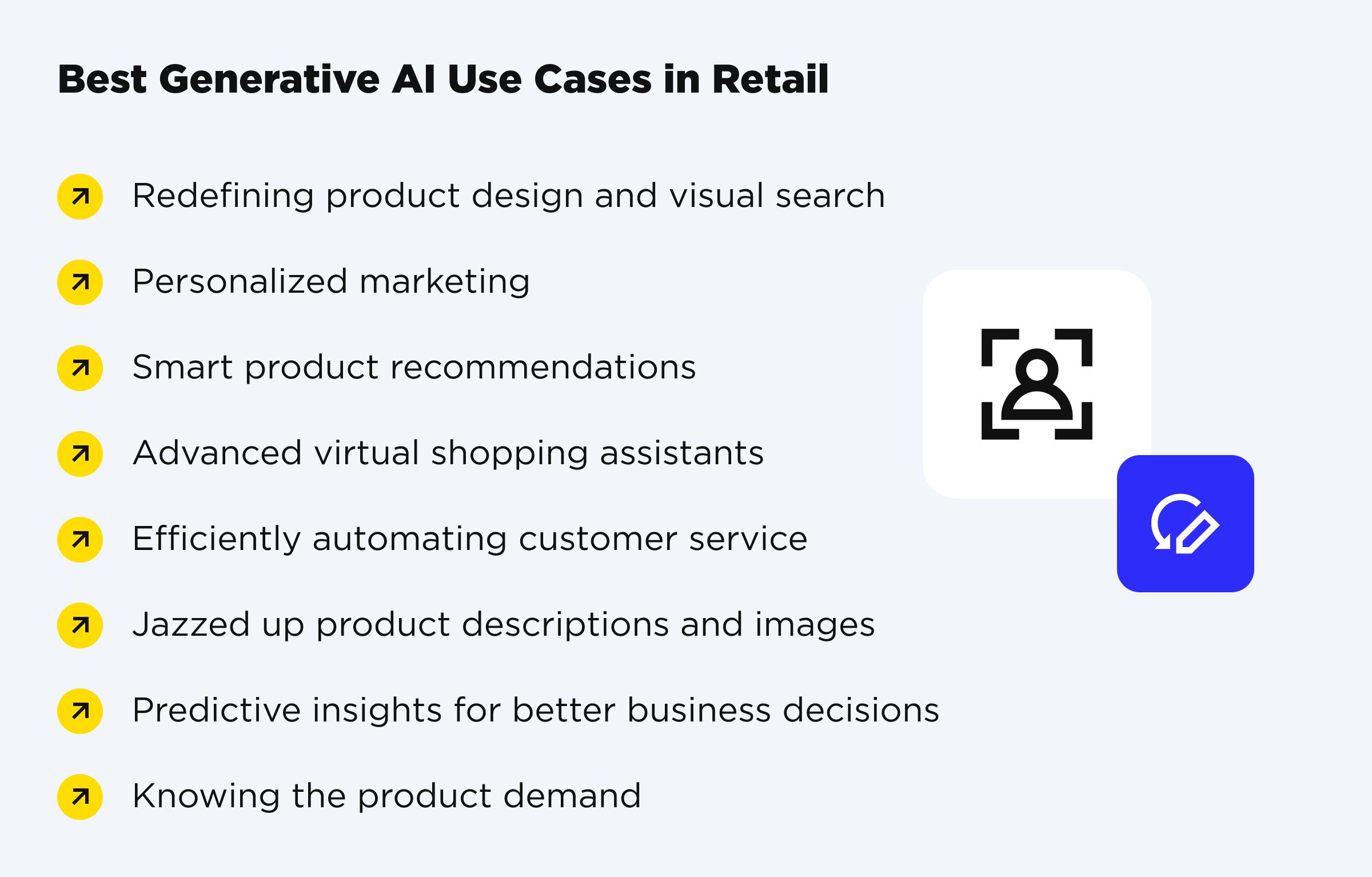
Redefining product design and visual search
Generative AI helps retailers create better product designs faster. Imagine uploading a rough sketch and getting a full-fledged design based on market trends, customer preferences, and material costs. This process reduces the time it takes to bring products from concept to reality. Visual search also gets a boost. Actually, customers can snap a pic of an item they like, and AI will find similar products across your store. This is similar to Google search but within an eCommerce store.
Personalized marketing
Forget one-size-fits-all marketing efforts. With AI, retailers can tailor marketing messages to individual customers. Generative AI sifts through customer data to determine what type of messaging, product suggestions, or offers work best for each shopper. The result? Higher engagement, better conversion rates, and a customer base that feels genuinely connected to your brand. And is more likely to become your returning customer. A great example is Amazon (some people call it a king of personalized marketing).
Smart product recommendations
Shoppers love personalized product recommendations, but only if they’re relevant. AI’s ability to analyze buying patterns means customers get individual recommendations that match their tastes and needs. These recommendations aren’t limited to just “people who bought this also bought that.” Instead, they consider contexts like recent searches, location, and even current weather conditions. The store that successfully uses this approach is Sephora, which sometimes seems to know better than you what you actually need.
New approach to inventory and supply chain management
Managing inventory can feel like walking a tightrope. Too much stock? You lose money. Too little? You lose customers. AI can help predict which products will be in demand and when to restock. It looks at historical data, seasonality, trends, and even external factors like market shifts. And the cherry on top? AI conducts inventory optimization as well as streamlines supply chains by flagging potential delays before they become problems.
Advanced virtual shopping assistants
Virtual shopping assistants are the future of online retail. They can guide customers through product pages, offer personalized styling tips, or answer questions like seasoned sales associates. Retail AI assistants are interactive and intuitive, giving customers a shopping experience that feels closer to in-person retail but with the convenience of staying at home. If you know, you know that H&M has implemented them with flying colors.
Efficiently automating customer service
Say goodbye to long wait times. AI-driven chatbots can handle everything from order tracking to returns without missing a thing. And because generative AI can understand natural language, these bots don’t just send scripted replies. They respond to customer queries in a way that feels human. No long wait times and frustration. No one is upset about it, right? In fact, according to the KPMG generative AI survey report, 58% of merchandising companies are considering the use of AI for customer service chatbots. The ball is in your court to decide whether you are in these 58%.
Jazzed up product descriptions and images
Creating product descriptions can be challenging, but with AI, it’s a breeze. Retailers can auto-generate descriptions and even update them based on trends or customer feedback. AI can also enhance product images, making them more appealing without needing a full photography and design team in-house.
Predictive insights for better business decisions
Retailers can use AI to generate actionable insights that help them make more informed decisions. Whether it's identifying which products will sell best during the holidays or which marketing strategies will drive the most sales, AI gives you data-driven answers that help fine-tune your business strategy. Even more, as the KPMG gen AI survey has determined, 70% of retailers predominantly prioritize generative AI in marketing and sales to boost their efforts.
Knowing the product demand
AI takes the guesswork out of demand forecasting. It uses historical sales data, market trends, and even real-time factors like social media hypes or weather patterns. The result? You know exactly when a product will sell and when to pull back on inventory. Whatever is needed for your business eventually leads to an increased return on investment.

Are you ready to take your business to the next level?
Contact usWhat Are the Challenges in Adopting Generative AI in Retail?
While generative AI is a game-changer, it’s not without its challenges. Here are some hurdles retailers need to be aware of:
Reputation risks
When AI gets it wrong, it can get really wrong. Automated content generation could lead to mistakes, like recommending inappropriate products or offering incorrect promotions. These missteps can hurt a brand’s reputation, so it’s crucial to have oversight in place.
Keeping customer data safe
Data privacy is a major concern. Customers are increasingly aware of how their data is used, and breaches can severely damage trust. Retailers need to be transparent about how AI handles customer data and ensure they’re adhering to privacy regulations.
Maintaining a human touch
AI is great, but it’s still not human. There’s a risk that over-reliance on automation could make customer interactions feel cold and robotic. Retailers need to strike a balance between AI efficiency and human interaction to keep their customers engaged.
What Does The Future of Generative AI in the Retail Industry Hold?
The future is bright for generative AI in retail. We’ve already felt how technologies are blurring the lines between online and in-person shopping experiences. As you can read in the article, retailers will be able to offer hyper-personalized, real-time shopping experiences that are fully driven by machine learning techniques and artificial intelligence algorithms.
But what can we expect? We’ve decided to tackle a few ideas that are possible to be expected in the years to come.
#1 VR shopping experiences (definitely like offline shopping)
#2 AI-generated virtual influencers (like, we don’t have enough influencers, right?)
#3 AI-driven fashion design (you can basically become your own designer)
#4 AR shopping assistants (both online and in-store)
#5 Retail Metaverse (blockchain will definitely penetrate into retail)
Expect to see more innovations in virtual fitting rooms, AI-powered trend forecasting, and even fully automated online stores. Are you excited about that?
Wrapping It Up: Should We Expect Generative AI to Revolutionize the Retail Industry?
There is no denying that generative AI in the retail industry is transforming everything upside down. What have we already witnessed? You’ve definitely noticed how much smoother the operations have become, customer experiences have got richer, and innovation has been faster. This is just a glimpse into what is yet to come. Of course, we should not forget there are still challenges to overcome. Yet, it’s clear that AI will continue to shape the future of retail. And it’s going to transform it in ways we’re just beginning to understand. Our recommendation to all brands - make sure to leverage this tech while preserving your personal touch. Are you ready to thrive in the next retail era? Buckle up and get ready with our OTAKOYI team!


